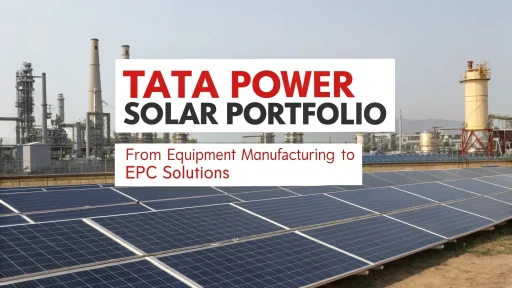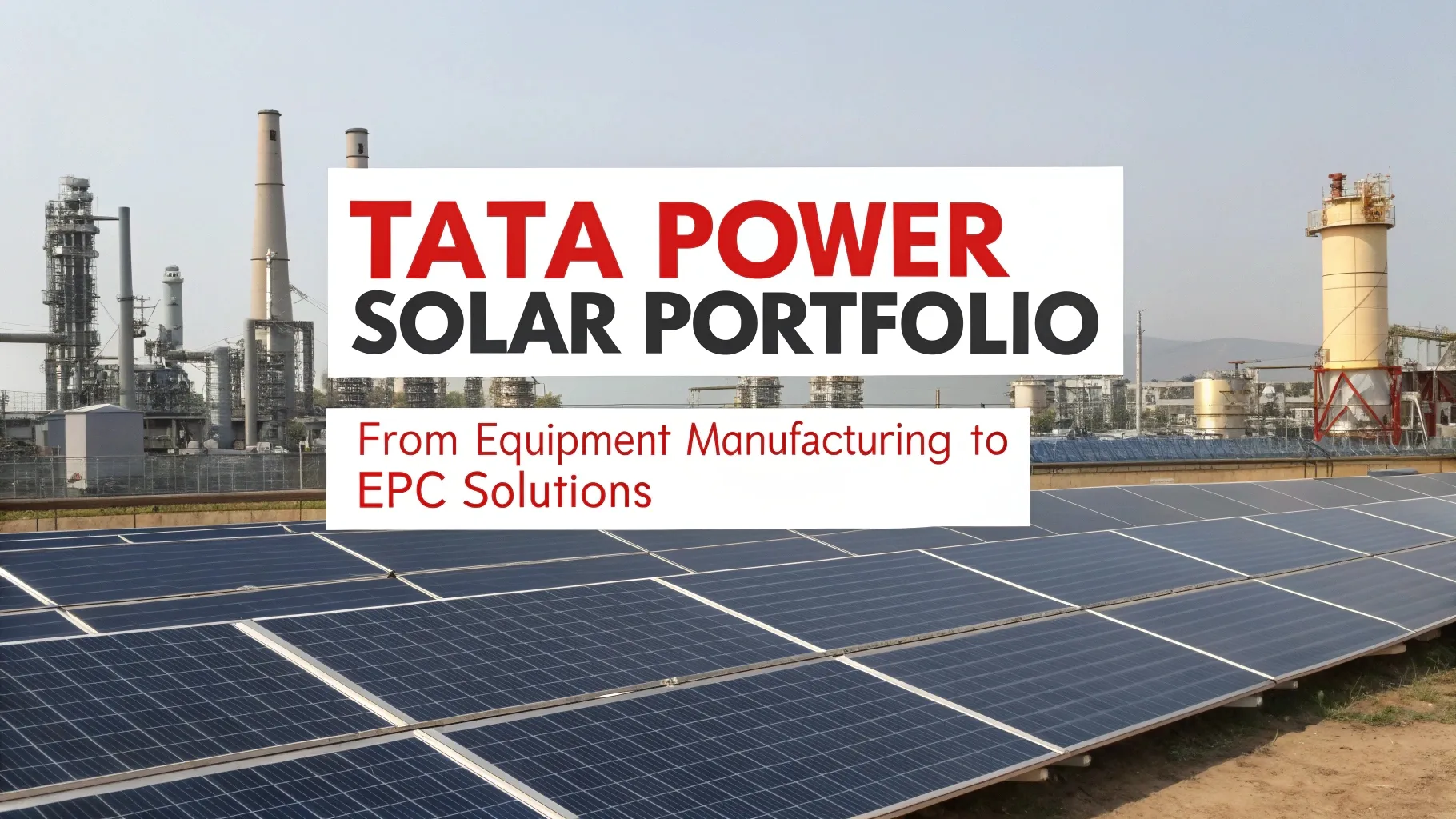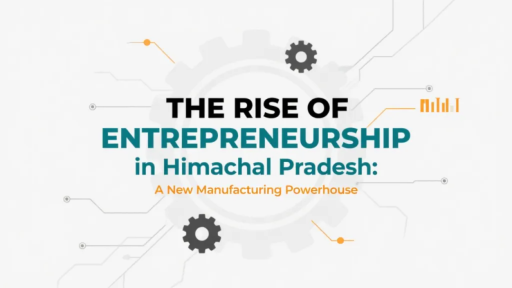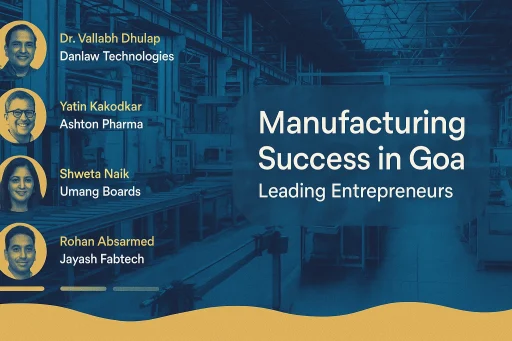Tata Power Solar Systems Ltd (TPSSL): Powering India’s Clean Energy Transformation
Tata Power Solar Systems Ltd (TPSSL), a subsidiary of Tata Power, has emerged as a cornerstone of India’s clean energy transformation. As one of the most vertically integrated players in the sector, TPSSL covers the entire solar value chain—in rotor manufacturing, solar cells and modules fabrication to providing EPC contracts, in construction, and beyond. It is no longer just a solar company; through the expansion into various sectors like energy storage, EV charging, and rural solar, it has become a full-stack clean energy platform.
Tata Power Solar now has an opportunity to self-initiate India’s clean energy reliance movement. With plans to reach a non-fossil energy capacity of 500 GW by 2030, Tata Power Solar is at an advantage due to the shifted focus on domestic production from PLI and ALMM. There is tremendous potential for startups, MSMEs, and EPC in TPSSL’s ecosystem for technology, infrastructure and service.
Context and Strategy Overview
Renewable energy in India has reached a new milestone. Moreover, with solar power sourcing over 70 GW of installed capacity, India is undergoing a structural shift—substituting imported solar hardware with a more technologically advanced, domestically anchored supply chain.Tata Power Solar was one of the early pioneers in this transition.Originally founded in 1989 as Tata BP Solar, the company is now fully owned by Tata Power. Moreover, as part of its long-term vision, Tata Power aims to transition 80 percent of its portfolio to clean energy by 2030.
This is not only a change in philosophy. The company’s investments, including the over ₹4,300 crore in its Tirunelveli gigafactory, showcase the commitment to vertical integration and serving EPC clients along with supporting the national energy ecosystem to guarantee continued demand. Concurrently, TPSSL has performed over 10 GW of EPC contract on diverse tiered renewable solutions from residential rooftops to grid scale installations.
Related: Tata Steel Kalinganagar: Building World Class Manufacturing for Next Generation Industrial Products
Manufacturing Infrastructure and Technological Capabilities
Tata Power Solar focuses on end-to-end manufacturing capabilities as a key strength. In fact, one of the company’s largest solar manufacturing facilities, located in Tirunelveli, Tamil Nadu, is among the most advanced in India.It has been operational since 2024, and its Tier 1 solar production lines have an annual capacity of 4.3GW which includes 3GW of solar cell production and 1.3GW of module assembly.
Furthermore, Mono PERC, Topcon (Tunnel Oxide Passivated Contact), and other advanced solar cells are manufactured at the mono-dedicated facility in the Tirunelveli plant.These technologies provide enhanced energy yields, improved temperature coefficients, and an extended service life. Additionally, the fully automated plant uses robotic material handling systems, AI for quality inspection, and digital twins for predictive maintenance.
Along with the new plants, TPSSL also operates its legacy plant in Bengaluru, increasing its total capacity to 300MW for cells and 400MW for modules. While this facility is relatively smaller in comparison, it specializes in researched and specialized products including custom modules for defense and hybrid energy applications.
As a result, with these two plants, TPSSL now has the capability to provide ALMM-compliant, PLI-eligible solar components with complete traceability and high-grade PQC (process quality control). Consequently, this type of solar PV manufacturing gives Tata Power Solar an edge in offering reliable, long-term Bankable EPC Contracts, as they ensure performance with minimal supply chain risks. interruptions.
Facilities Overview
| Location | Technology | Capacity | Commissioned |
| Tirunelveli | Mono PERC, TOPCon | 3 GW Cells + 1.3 GW Modules | 2024 |
| Bengaluru | Mono PERC, Polycrystalline | 300 MW Cells + 400 MW Modules | 2011 |
For more information check out Project Reposts
Scale in EPC Execution Capabilities
To date, Tata Power Solar is the leading solar EPC company in India, as they have commissioned over 9.7 GW of utility-scale solar projects and 1.2 GW of rooftop solar installations. The company accomplished these projects under some of the most challenging environmental and logistical conditions such as deserts, water bodies, and industrial rooftops.
Notably, one of the landmark projects is the 1 GW solar EPC contract awarded by SJVN, valued at ₹5,500 crore. This was the largest single solar EPC order in India at that time.The company has also executed the 450 MW Bikaner Solar Park in Rajasthan, the 400 MW Dholera solar tracker-based plant in Gujarat, and several floating solar projects including the NTPC’s 100 MW Kayamkulam project.
In addition, the company’s internal EPC functions are complemented by advanced engineering mechanisms, project monitoring systems, and efficient logistics in the supply chain.Moreover, at REI Expo 2023, TPSSL was awarded “Leading EPC Company,” and as per Mercom India’s report for H1 2024, TPSSL held a 32.7 percent market share in the utility-scale EPC segment.
Product Portfolio and Custom Solutions
Tata Power Solar’s offerings include rooftop solar systems for residential, commercial, as well as institutional clients and other more than just solar panels and installations.One of the most remarkable rooftop projects is the 820 kWp installation at the Cricket Club of India in Mumbai, which enables the club to meet a significant portion of its energy requirements.
For ground-mounted utility projects, the company also offers integrated solar systems utilizing bifacial modules with single-axis trackers and AI-based supervision. For example, one of the most remarkable rooftop projects is the 820 kWp installation at the Cricket Club of India in Mumbai, which enables the club to meet a significant portion of its energy requirements.
Tata Power Solar is pursuing other innovations such as vertical solar farms for space limited cities, building integrated photovoltaics (BIPV), and microgrids in containers for remote regions. Additionally, these modular solutions can be rapidly deployed and have plug-and-play capabilities that make them ideal for disaster response, rural electrification, and mobile infrastructure.
Clean Energy Other Than Solar: Storage, EVs, and Access in Rural Areas
Additionally, these modular solutions can be rapidly deployed and have plug-and-play capabilities that make them ideal for disaster response, rural electrification, and mobile infrastructure. Furthermore, the company has expanded into rural solar power projects, electric vehicle infrastructure, and battery energy storage.
The company is also constructing one of the largest Battery Energy Storage Systems (BESS) in India. In Rajnandgaon, Chattisgarh, they are developing a 100MW / 40 MWh BESS which will provide grid-balancing services to enhance the reliability of energy provided.
Tata Power is also investing in solar energy in rural areas. TPSSL has deployed over 76,000 solar powered irrigation pumps. With the aid of smart controllers and remote monitoring, diesel reliance and productivity have been greatly improved.
As an electric vehicle leader in India, Tata Power extends its operations through Tata Power EZ Charge, India’s largest EV charging network. With over 6,000 charging points, the company is powering an integrated electric mobility infrastructure supported through solar powered and battery backed charging stations.
Related: 60+ Upcoming Industries in India You Can’t Ignore
Financial Strategy and Their Economic Impact
In the case of Tata Power Solar, the expansion strategy is driven by strong financial discipline while creating sustainable value over the long term. The Tirunelveli facility alone required a capital expenditure of ₹4,300 crore. As part of their clean energy verticals, Tata Power has plans to invest over ₹60,000 crore by 2030.
TPSSL’s FY2024–25 revenue stands at ₹12,000 crore, driven by profitability from economies of scale, in-house component sourcing, and execution excellence on projects. Tata Power’s full-stack approach drives better optimization of margins, lowers imports, and provides protection against global supply chain constrictions.
As part of their initiatives, the company has created over 10,000 direct and indirect jobs in addition to the financial return, fostered local manufacturing, and furthered India’s agenda to achieve energy independence.
Encouragement for Startups and Entrepreneurs
Tata Power Solar showcases a collaborative ecosystem that provides numerous points of entry for MSMEs and technology-driven ventures, including for the design and innovation centers.
In the manufacturing industry, startups can launch automation supplies such as machine vision systems, quality monitoring devices, and AI-driven yield prediction software. In EPC services, firms can partake in fabrication, logistics, SCADA systems, and O&M analytics. There are also collaborative opportunities in the development of inverters, energy management systems (EMS), and microgrid design for battery storage and hybrid systems.
From solar-integrated charging systems to predictive maintenance tools, EV infrastructure offers diverse opportunities for businesses to focus on fleet analytics and charger billing software systems.
Tata Power fosters bounded and open innovation via innovation competitions like Tata InnoVerse, strategic partnerships with research institutions and accelerators, and providing co-development, pilot testing, and customer access solutions for their wide-ranging clientele.
Why Entrepreneurs Should Consider Solar Manufacturing Businesses
As India moves towards cleaner sources of energy, the solar manufacturing industry is proving to be one of the most attractive and viable opportunities for new entrepreneurs, family-owned MSMEs, or industrialists looking for diversification into genres that are future-ready. The ALMM compliance requirement and the Production Linked Incentive (PLI) scheme offering domestic solar modules have created a thriving opportunity for fresh competition.
While the solar EPC and installation business has a lot of competition and is difficult to manage, the solar component manufacturing business is module assembly, backsheet production, EVA sheets, junction boxes, aluminum frame, and inverter manufacturing. These have a good ratio of scalability to export potential and long-term value, which makes them easier to operationally manage.
Market Opportunity & Demand Landscape
India is the third largest consumer of solar energy, but importing over fifty percent of solar modules makes it a strange situation to be in. With policies directed towards self-reliance, the Ministry of New and Renewable Energy (MNRE) aims for achieving 100 GW of annual domestic manufacturing capacity by 2030.
Let’s analyze the opportunity by segment:
Manufacturing Solar Modules
| Segment | Estimated Market Size of 2030 (INR) | Key Growth Drivers |
| Solar PV Modules | ₹ 1,25,000+ crore | PLI incentives, ALMM mandates, demand expert |
| Solar Inverters (String/Central) | ₹ 22,000 crore | Smart grid integration, hybrid projects |
| EVA, Backsheet, Glass, Frames | ₹ 18,000 crore | Backward integration, rising production of modules |
| Solar Cells | ₹ 50,000 crore | PLI-backed projects, shifts in supply chains globally |
| Battery Energy Storage Systems (BESS) | ₹ 65,000 crore | Projects with renewable time matching, hybrid plants, balancing grid |
It includes the amount of investment for the business and also reflects the driving policies along with the international commitments and the electrifying of industries further adds up to the total amount invested.
In the case of new entrepreneurs, the module assembly provides the easiest to access entry point which lowers the initial capital requirement compared to cell production and has a higher degree of localization.
What Entrepreneurs Can Learn from Ratan Tata’s Industrial Growth Strategies
Ratan Tata, who led the global expansion of Tata Group, did not forge his legacy only through acquisitions or boardroom maneuvers. He succeeded by anticipating long-term societal shifts and aligning business investments to strategically serve them. Here is how his methods can be used by entrepreneurs focusing on renewable energy:
1. Scale with Integrity, Start with a Purpose
Building businesses to solve India’s challenges was a philosophy embraced by Ratan Tata, alongside a need for profit. Befitting the entrepreneur’s ethos is clean energy, just like affordable mobility (Tata Nano) and telecom (Tata Indicom), where societal value and business interests coincide.
2. Make Early Investments in Technological Advancements and Partnerships
Strategic European technology transfers by Tata Steel and EPC innovations by Tata Power are striking examples of investing in world-class equipment, skills, and alliances. For solar entrepreneurs, automation and global tech standards can be game-changers if incorporated from the outset.
3. Build Beyond Headlines and for Longevity
Ratan Tata’s vision extended beyond quarterly wins. He invested decades transforming loss-making businesses into legacy powerhouses. Similarly, solar entrepreneurs should adopt a decade-long view, plan in reverse from market demands, and embed uncompromising quality from inception.
4. Ethical Brand, Global Mindset
Tata’s global reputation stems from ethical governance, quality assurance, and employee relations. For solar startups, brand trust through product warranty, safety, traceability, and compliance will yield reputational returns.
As Ratan Tata once said:
“None can destroy iron, but its own rust can. Likewise, none can destroy a person but his own mindset.”
The same holds true for startups. Purpose-driven, resilient mindsets help forge paths even in capital-intensive sectors like solar.
Key Success Tools and Readiness Essentials
Entering into solar manufacturing necessitates regulatory compliance alongside technical setup and market positioning. In support of entrepreneurs venturing into this space, here are some essential steps:
1. Feasibility & DPR Support
Begin with a professionally crafted Detailed Project Report (DPR) featuring competitive break-even analysis, technical layout, and financing options. NIIR Project Consultancy aids in creating bankable DPRs for specific solar-line products like module assembly or inverter manufacturing.
2. Regulatory Compliance & Certification
BIS modules, ALMM inclusion, and environmental clearances are amongst mandatory certifications that need to be understood. We assist clients with application filing and ensure timely submission of required documents to prevent delays in commissioning.
3. Technology Selection & Line Design
Deciding on Mono PERC, TOPCon, or HJT technologies can determine the success of the investment. With consideration to market presence and capital availability, we assist in designing optimized production lines and equipment partner sourcing.
4. Funding & PLI Scheme Navigation
Mixing equity finance, term loans, and central schemes like PLI or state industrial incentives requires precision. Structuring funding packages and investor decks is where NIIR’s project finance advisors step in.
5. Marketing & Sales Onboarding
Enrollment of distribution partnerships, EPC partners like Tata Power Solar, and B2B resellers demand execution on a strategy-first basis. We also assist with GTM strategy for both local and global markets.
6. Talent & Automation Integration
From day one, we aid in the installation of production-grade ERP, MES systems, and AI-powered QC, which sets up a foundation for Industry 4.0-powered manufacturing.
Final Thoughts: Your Journey From Idea To Enterprise – Begins Now
The solar manufacturing industry presents a multifaceted opportunity due to its impactful nature coupled with strong policy backing, increasing demand, and sustainable long-term growth potential.
Tata Power Solar confirms that a vertically integrated business model, innovation focused, and operating with ethical practices can achieve success at a national scale. By adopting these principles, bold entrepreneurs willing to venture into manufacturing can not only create value, but also help strengthen India’s energy independence and leadership in global renewable energy initiatives.
At NIIR Project Consultancy, we have dedicated over 40 years assisting Indian entrepreneurs transform concepts into industries and turn ideas into reality. Comprehensive market research to plant establishment, financing to devising an export-readiness plan—We walk alongside you in the clean-tech entrepreneurial journey.






